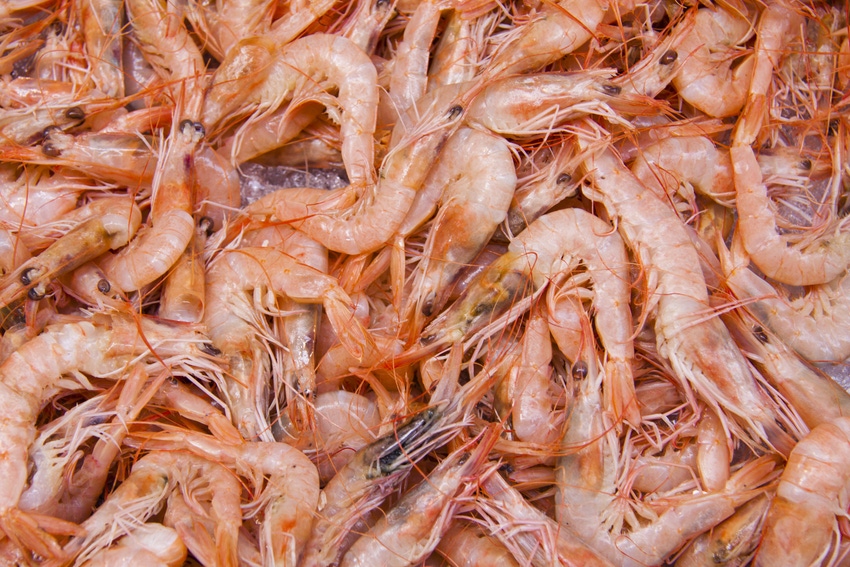Sustainability of plant ingredients questioned as fish meal substitutes
Team researches trade-offs between marine and terrestrial resources when replacing fish meal with plant ingredients in shrimp feeds.
April 12, 2019

Substituting fish meal in aquaculture feeds with plant ingredients may not be as beneficial for the environment as many predict, according to new research from an international team of experts led by the University of Stirling in the U.K.
Manufacturers of commercial fish feed are increasingly substituting fish meal — a powder made from fish — with crop-based ingredients in a move driven by economic incentives and a desire to improve the sustainability of aquaculture feed, according to an announcement from the University of Stirling.
While this approach is widely recognized as being more environmentally friendly, the new study — led by researcher Wesley Malcorps from the University of Stirling’s Institute of Aquaculture — challenges this theory.
The multidisciplinary team researched the trade-offs between marine and terrestrial resources as a result of adopting this common practice in shrimp feeds. The researchers focused on the shrimp industry, because it is one of the dominant users of fish meal in the aquaculture sector, the announcement said.
The research found that the substitution of fish meal with plant ingredients merely moved pressures from finite marine resources to land-based food production systems and had environmental repercussions, according to the researchers, who are now calling for a “paradigm shift” in thinking regarding the relative sustainability of aquaculture feed ingredients.
“Substituting fish meal for plant ingredients is considered by many to be environmentally sustainable, as it reduces dependency on finite marine resources. However, this would shift resource demand from the oceans onto the land, potentially adding pressure to the land-based food production systems, which are already under pressure to meet global demand for food, feed, biofuels and bio-based materials," Malcorps said. "In turn, this would affect the environment and biodiversity as well as the availability and prices of crops.
“In addition, the nutritional requirements of certain aquatic species may limit the amount of fish meal substitution due to essential nutrients, which are variable or imbalanced in terrestrial plant ingredients. Furthermore, increased inclusion of plant ingredients in [aquaculture feed] could also affect the nutritional value of farmed seafood,” he added.
Fish meal is manufactured predominantly from small pelagic fish as well as from fish processing waste. Currently, the waste element makes up, on average, between 25% and 35% of the product; however, this share is on the increase, the announcement said.
Over the years, in response to fish meal price increases, the product has been increasingly substituted with plant ingredients. In 2000, shrimp feed included 19-40% fish meal, but that had fallen to 11-23% in 2014.
The study modeled incremental substitution, from 20-30% to 0%, of fish meal with plant ingredients — such as soybean meal concentrate, rapeseed meal concentrate, pea protein concentrate and corn gluten meal — which are typically included in modern feeds for the two main shrimp species produced globally: whiteleg shrimp (Litopenaeus vannamei) and black tiger shrimp (Penaeus monodon).
The team then assessed the impact this could have on marine and terrestrial resources, such as fish, land, fresh water, nitrogen and phosphorus.
According to the announcement, the research found that complete substitution of 20-30% of total fish meal — depending on the species — could lead to increasing the demand for fresh water by up to 63%, for land by up to 81% and for phosphorus by up to 83%.
“These are significant increases, as only a small proportion of the feed is actually substituted,” Malcorps explained. “Our findings suggest this approach would lead to additional pressures on essential agricultural resources, with associated socioeconomic and environmental effects as a trade-off to pressures on finite marine resources. It could lead to competition for land and other terrestrial resources, causing social and environmental conflicts that, in turn, may affect the resilience of the global food system.”
Aquaculture feed generally utilizes only a small percentage of global crop production. However, with aquaculture being one of the fastest-growing food sectors, the experts warned that additional pressures on crucial terrestrial resources “may become more obvious” over the coming decades, the university noted.
Malcorps added, “Our model highlights the need for a paradigm shift in the definition of sustainable shrimp feed. Additionally, the model may be equally applicable to other intensively farmed species with similar scenarios of marine and terrestrial feed ingredient requirements. An excessive dependency on the use of plant ingredients for aquaculture could lead to deleterious effects on the environment and indirectly impact human health by altering the nutritional value of the aquaculture products.”
Malcorps suggested finding an “optimal balance” between marine and terrestrial resources in aquaculture feed, strategically including high-quality fish meal, improving the use of fish byproducts and food waste in feeds and investigating the potential for including novel ingredients, such as microbial biomass, algae and insect meals.
The multidisciplinary team included industry and academic experts from across the world, including: MatureDevelopment BV (Netherlands), the Research Institute for Agriculture, Fisheries & Food (Belgium), Mexico Aquaculture Research Inc., Association of International Seafood Professionals (Australia), Aquaculture without Frontiers (U.S.), Universidad Tecnológica del Mar de Tamaulipas (Mexico), IFFO, The Marine Ingredients Organization (U.K.), Utrecht University (Netherlands), University of Zürich (Switzerland) and Harper Adams University (U.K.).
The study, "The Sustainability Conundrum of Fish Meal Substitution by Plant Ingredients in Shrimp Feeds," was published in Sustainability.
Source: University of Stirling, which is solely responsible for the information provided and is wholly owned by the source. Informa Business Media and all its subsidiaries are not responsible for any of the content contained in this information asset.
You May Also Like



